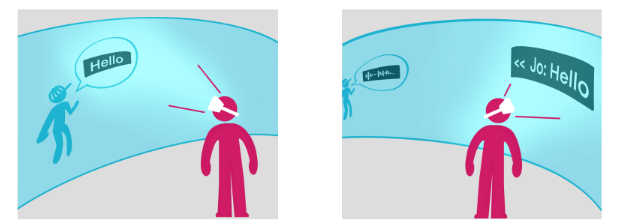A new whitepaper for captioning in digital environments including virtual reality has been published by Stagetext to support inclusion for deaf, deafened and hard of hearing audiences.
More and more artists and theatre makers are experimenting with technology such as virtual reality to transform the way audiences experience performance in deeply engaging and interactive environments. But how do we ensure these performances are accessible for everyone?
Working with technology consultants Peak Signal, the research into immersive captioning for theatre productions – whether through augmented reality, virtual reality, mixed reality or extended reality theatre (XR) – has led to the development of a framework that seeks to address the unique challenges of providing text based deaf access in a virtual environment.
There are 18 million adults who are deaf, deafened or hard of hearing in the UK which means 1 in 3 people may benefit from subtitles and captions to experience arts and culture. Yet, text-based deaf access is not as widely available as it could be.
Captioned traditional theatre performances held in venues and watched in person have the captions displayed on large screens at the front of the stage. For extended reality theatre productions, captioning presents unique challenges as keeping captions in one place can be inaccessible and cause other problems.
In a 360º environment, fixed-position captions can be difficult to follow because they do not move with the audience member’s changing perspective. This can lead to situations where captions are out of view or require the viewer to constantly shift their focus which can detract from the immersive experience as well as heighten the risk of static captions contributing to VR motion sickness
The research, which was funded by Innovate’s Audiences of the Future 2 Fund, addresses the unique challenges by providing critical information for each line of captions, looking at how to map items in the virtual world to captions; and how to dynamically adjust caption presentation based on user interaction within the virtual environment.
When creating extended reality theatre productions, Stagetext also recommends that captions are scripted in advance and are not autogenerated, as these tend to be less accurate and therefore of a lower quality.. Following our captioning display standards ensures that deaf, deafened and hard of hearing audiences enjoy a truly accessible experience – whatever format it takes.
Melanie Sharpe, CEO of Stagetext said:
“As a charity focused on deaf access, this is an exciting piece of research that explores how accessible captions could be integrated within extended reality environments – and by sharing these findings, artists and theatre makers can build upon our research to create wonderful artistic pieces of work that are accessible to deaf, deafened and hard of hearing people.
With new figures showing that 1 in 3 adults in the UK are deaf, deafened and hard of hearing, considering access at the outset of planning an extended reality performance is key. We are here to support the creative sectors with our knowledge of best practice in quality captioning to help make any theatre productions deaf accessible – whether that be traditional, immersive or extended reality.”
Paula Mathews, Partner, Peak Signal said:
“Partnering with Stagetext on this research has been invaluable. By combining their deep expertise in accessible captioning with our technological insights, we’ve been able to explore innovative solutions that make extended reality environments more inclusive.
“This research underscores the importance of integrating accessibility from the very beginning, ensuring that all audience members can fully experience the magic of all forms of theatre performances.”
The whitepaper can be found here.
If you’d like to discuss how to make your performances accessible for deaf, deafened and hard of hearing audience members, please get in touch. If you’d like more information on the technical processes proposed, please contact our technology consultants Peak Signal: Contact



